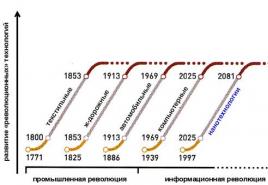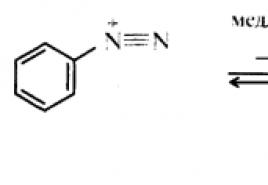The meaning of the word "context" Meaning of the word context Context words
Hello, dear readers of the blog site. We continue to analyze those terms that may cause difficulties to one degree or another in their perception among ordinary users. For example, not everyone fully understands, or, although in many cases it may be useful.
The next concept, the interpretation of which I would like to offer you, is “context”. Most people rightly associate this word with the famous expression “taken out of context”, which implies that some word (phrase) from a conversation or text was used in isolation from the main content, as a result of which its meaning, which was originally intended, was completely distorted.
Context is...meaning-related content
The term itself comes from Latin "context", which in translation means connection, connection, connection. But this is just a translation. I will now try to give a definition that is understandable to everyone, so that you fully understand the meaning of the word context.
This, in the generally accepted understanding, is a completed fragment of text or colloquial speech, where certain phrases are in an inextricable semantic connection with the content of the entire passage in which they are included. Words or phrases used outside of this fragment (taken out of context) carry a distorted meaning.
But context elements can be not only pieces of ordinary text or verbal statements, but also a wide variety of other objects. All of the above will be confirmed by the illustrative examples that will now follow.
Example 1. Look at the screenshot below for a well-known phrase that is often used, but which is actually said to be taken out of context from the original source:

I think everything is clear here. Such cases very often occur when unscrupulous journalists, for example, try to “earn a reputation” or give fame to their publication by printing specially selected pieces from full interviews with popular people. It seems that the words have not been changed in principle and correspond to reality, but out of context they distort the meaning of what was said.
Example 2. A man comes to fish and asks a fisherman fishing nearby: is he biting? Which will receive an adequate answer, and all because the question is asked in the right context. Now imagine that the same thing (“is it biting?”) will be asked of a simple passer-by on the street. This will at least cause surprise, since this question is no longer connected in any way with a specific situation.
Example 3. Known to all users context menu(a list of possible actions in relation to the selected object) is also part of the context within a group of similar elements, for example, files ():

Moreover, for text files the menu contains one list, for video files another, etc. Although most items may be general, these menus as a whole should be considered distinct and valid for their own area.
Example 4. For webmasters, and for everyone involved in online business, I am familiar contextual advertising from Yandex or Google, the content of which fully corresponds to the theme of the pages of the sites on which it is located:

Due to the fact that the content of such advertisements is in the context of the entire web page, visitors are more willing to click on them, which brings good income to the site owner and, accordingly, to the advertiser who pays for their placement.
I think now, based on everything stated above, you can correctly answer the question for yourself: what is context? Moreover, in all its various manifestations. Well, in real life it is very important to use this or that expression in the right verbal environment, otherwise your saying may be misunderstood by your interlocutor.
And if this interlocutor suddenly conveys your words concerning a third party to him, then the consequences may be irreversible (after all, a word is not a sparrow). Not to mention the fact that it won’t take long to make not only ill-wishers, but even enemies.
As a final touch to today’s topic, be sure to watch the video, which highlights the importance of correct translation from one language to another in the right context (for example, in English there are a lot of words that have several meanings, often with different, and sometimes even opposite) meaning).
Ushakov's Dictionary
Context
conte kst, context, husband. (lat. contextus - plexus, connection) ( Philol.). A coherent verbal whole in relation to a specific word or phrase included in it. You need to take the phrase in context, and then it will become clear.
Context
(lat. contextus - close connection, connection).
1) A complete, semantically, segment of written speech (text), which makes it possible to accurately establish the meaning of an individual word or sentence included in it.
2) Conditions for using a given linguistic unit in speech (linguistic environment, and in a broad sense also the situation of speech communication). Determine the meaning of a word by context.
Culturology. Dictionary-reference book
Context
(lat. contextus – connection, coordination, connection)
the general meaning of socio-historical and cultural conditions that make it possible to clarify the semantic meaning of the results of human activity.
Dictionary of linguistic terms
Context
(lat. contextus close connection, connection)
1) Lexical context – verbal environment, lexical position of a word. The context reveals one or another meaning of a polysemantic word;
2) everyday context - a situation that determines in what meaning the word is used ( operation: surgical operation, combat operation, financial operation);
3) speech environment, compositional speech system, presupposing the unity of the content plan and the expression plan.
Forensic encyclopedia
Context
(lat. contextus - connection, connection)
a semantically complete segment of written or oral speech that allows one to establish the meaning of an individual word or phrase included in it.
Terminological dictionary-thesaurus on literary criticism
Context
(from lat. contextus - cohesion, connection) - a segment of a speech chain that makes up the environment of a language unit included in this chain.
RB: language. Visual and expressive means
Integer: text
Type: grammatical context, semantic context, phonetic context
Ass: subtext
* "Poetic language opens up new possibilities for the interaction of a word and its environment, the influence on the perception of a poetic word of its phonetic, grammatical, semantic context. The poetic context influences the element included in it: certain semantic features in the word are emphasized, optional features are added, elements of meaning are suppressed , combining meanings while maintaining a certain independence of each of them, contrasting underlining, etc.” (O.G. Revzina). *
Explanatory translation dictionary
Context
1. The linguistic environment in which a particular linguistic unit is used.
2. The linguistic environment of a given linguistic unit or the situation in which it is used. There is a small context, i.e. those lexical units that surround a word, phrase, and large context - the information reserve of the source of speech, i.e. his knowledge, past experience related to the meaning of lexical units. Context is the most important component of linguistic guesswork.
3. A semantically complete piece of written speech that allows one to establish the meaning of the word or phrase included in it.
4. Sources from which the receptor extracts additional information regarding the content of language code units.
5. Linguistic situation.
6. Conditions, features of the use of this element in speech.
7. Linguistic environment of a word, statement; text content.
8. The set of those formally fixed conditions in which the content of any speech-language unit is unambiguously revealed. Depending on the hierarchical level of consideration of a specific speech-language unit, on the level of actualization, indication, the context can be lexical, morphological-syntactic, syntactic, semantic, etc. When considering certain stylistic devices in their environment at the stylistic level, the stylistic context appears. A context containing neutrally colored speech-language units is a neutral context.
9. A fragment of text that includes the unit selected for analysis.
10. Linguistic environment of a word, statement; text content. Words are phrases that surround a particular word, and depending on what kind of construction we create, the words acquire one or another meaning.
Context is the most common way to disambiguate. But there are also others - the situation and the so-called background knowledge.
Westminster Dictionary of Theological Terms
Context
♦ (ENG context)
(from lat. contextus - woven together)
social position of a group or class. This is a general social position, according to liberation theology, is the main theological task. The making of theology is inevitably intertwined with all social dimensions of life.
encyclopedic Dictionary
Context
(from Latin contextus - connection, connection), a relatively complete fragment of written or oral speech (text), within which the meaning of the individual words, expressions, etc. included in it is most accurately revealed.
Ozhegov's Dictionary
KONT E KST, A, m.(book). A relatively complete semantically complete part of a text or statement. The meaning of a word is learned in context.
| adj. contextual, oh, oh And contextual, oh, oh.
Efremova's Dictionary
Context
- m.
- A passage of text or speech necessary to determine the meaning of a word or phrase included in it.
- trans. A set of various factors necessary to understand, explain something. phenomena of reality.
Sentences containing "context"
The rest is increasingly difficult to interpret both within the framework of the logic of the decisions made and in the context of other decisions.
The first context of their use can generally be called the context of original meanings and original functions.
A symbol, both in terms of expression and in terms of content, always represents some kind of text, that is, it has a certain single, self-contained meaning and a clearly defined boundary that allows it to be clearly distinguished from the surrounding semiotic context.
The state seeks to play a more active role in giving pre-revolutionary things new contexts and meanings and, thereby, subordinating the process of giving them new value in response to the destruction of the utilitarian everyday context of using old things.
In this context, it is not so strange that France has not signed an agreement with Russia on the mutual recognition of educational documents.
A multi-layered and semiotically heterogeneous text, capable of entering into complex relationships with both the surrounding cultural context and the readership, ceases to be an elementary message directed from addresser to addressee.
On the one hand, this or that private text can play the role of a describing mechanism in relation to the cultural context, on the other hand, it, in turn, can enter into deciphering and structuring relationships with some metalinguistic formation.
On the other hand, the symbol actively correlates with the cultural context, transforms under its influence and itself transforms it.
It was they, and not people who considered themselves psychologists, who began to generate reliable and useful psychological knowledge, which entered the context of labor psychology and engineering psychology.
Russian language dictionaries
CONTEXT, -a,m. (book). A relatively complete semantically complete part of a text or statement. The meaning of a word is learned in context. || adj. contextual, -aya, -oe and contextual, -aya, -oe.
View value CONTEXT in other dictionaries
Context M.— 1. A passage of text or speech necessary to determine the meaning of the word or phrase included in it. 2. transfer The combination of various factors necessary to understand........
Explanatory Dictionary by Efremova
Context- context, m. (Latin contextus - plexus, connection) (philol.). A coherent verbal whole in relation to a specific word or phrase included in it. We need to take the phrase in context........
Ushakov's Explanatory Dictionary
Context- -A; m. [from lat. contextus - plexus, connection]
1. A semantically unified part of a text or statement that allows one to establish the meaning of the word or phrase included in it.........
Kuznetsov's Explanatory Dictionary
Context- (from Latin contextus - connection - connection), a relatively complete passage of written or oral speech (text), within which the meaning of individual ......
Large encyclopedic dictionary
Context- (English context).1. A semantically complete passage of text necessary to determine the meaning of an individual word or phrase included in it. In a broad sense, K. includes......
Psychological Encyclopedia
Context— - a set of characteristics that clarify the conditions of existence of a given phenomenon to be studied, i.e. localize events or processes in space and time.........
Sociological Dictionary
Historical and Sociocultural Context of the Development of European Culture and Philosophy— It seems advisable to mentally “draw” a kind of diagram of the most important historical events and cultural phenomena of the period we are interested in - in order to imagine......
Philosophical Dictionary
Context- (from lat. contextus - cohesion, connection, connection) - a relatively complete passage of text or oral speech in meaning, within which the most accurate and specific is revealed......
Philosophical Dictionary
Scholastic Philosophy. Sociocultural Context of the Development of Medieval Philosophy— The Middle Ages in Western Europe were separated from antiquity by the era of the great migration of peoples, barbarian invasions that put an end to the existence of the Western Roman......
Philosophical Dictionary
What is Context? The meaning of the word “Context” in popular dictionaries and encyclopedias, examples of the use of the term in everyday life.
The meaning of "Context" in dictionaries
Context
– Ozhegov's Explanatory DictionaryContext M. – Explanatory Dictionary by Efremova
1. A passage of text or speech necessary to determine the meaning of a word or phrase included in it. 2. transfer A set of various factors necessary to understand, explain something. phenomena of reality.
Contextual Theory – Psychological Dictionary
The theoretical view that all behavior must be analyzed in the context in which it occurs, and that interpreting any action out of context will ultimately lead to confusion.
Contextual Theory – Psychological Encyclopedia
– Psychological Dictionary
See context-specific learning.
Context Specific Learning – Psychological Encyclopedia
Contextual Adj. – Explanatory Dictionary by Efremova
1. Correlative in meaning. with noun: the context associated with it. 2. Inherent to the context, characteristic of it.
Contextualization – Psychological Dictionary
Cultural Indicator: The extent to which cultures reward divergent behavior according to the specific context within which the behavior occurs.
Contextualization – Psychological Encyclopedia
Contextualism – Psychological Dictionary
See context theory.
Contextualism – Psychological Encyclopedia
Contextual Association – Psychological Dictionary
(contextual association) Context occupies an important but ambiguous position in psychology. theories. In early studies English-speaking psychologists referred to the context as background stimulation that reinforces and maintains behavior. Because context was given the same logical status as other sources of stimulation, it could be treated as another stimulus capable of associating with other events. Used thus. the context has allowed psychologists to explore the question of how experience, or more accurately, learning, can modify our perceptions. E. B. Titchener, the recognized leader of structuralism in the United States, proclaimed that sensations acquire meaning thanks to the context in which they arise. Simple sensations have no meaning: meaning appears only when the primary sensation is accompanied by other sensations or images. According to E. B. Titchener, meaning is the totality of sensations conjured up whenever a particular sensation is experienced in a particular context. Several Previously, W. James discussed how initially mixed stimuli are distinguished by adding more distinguishable features, or associations, to each stimulus. Why are there such different schools - the structuralism of E. B. Titchener, the functionalism of W. James and the neo-behaviorism of modern times? theorists - treat context equally? Despite numerous differences, all these directions originate from empiricism. Like empiricism, they place the main emphasis on the analysis of phenomena and their decomposition into fundamentals. elements, and also share the call for associationism regarding the need to take into account the unity of the psyche. life. Although the context that comes into connection with the events taking place in it may. considered as a stimulus, it is equally likely that the context of the stimulus can serve as a meta-message that classifies the elementary stimulus (signal). The message conveyed by a signal can be determined by the context in which it is located. Dr. In other words, the same stimulus in different contexts can convey different messages. Context, viewed in this light, becomes a superordinate concept that hierarchically orders and structures behavior. See also Perception, Structuralism E. Rickert
2
Quite often, users come across not entirely clear expressions and words on the World Wide Web that require additional interpretation. That is why on the website you will find many explanations of the most popular terms and concepts. Don't forget to bookmark the resource so you can come back to us from time to time. Today we will talk about a rather interesting word that is found everywhere, this Context You can find out what the word means a little below.
However, before continuing, I would like to recommend you a couple more sensible publications on the topic of Internet slang. For example, what does Friend mean, how to understand the word BLJad, what SAS means, what is Custom, etc.
So, let's continue, what does the word Context mean? This term was borrowed from the Latin “contextus”, which can be translated as “to weave”, “to weave”. However, this concept came to Russia in the 18th century, and came from the French word " context".
Context- this is a certain set of surrounding circumstances, some object
Context- this is the verbal (in colloquial speech) or textual environment of a phrase. The mentioned environment has a complete meaning, and is essentially a paragraph into which large text is divided so that it is easier for the reader to understand it
Context- this is a part of speech that “stores” information that allows you to decipher further expressions and sentences, taking into account previously voiced references to any information
Context- this is a semantic situation, based on it, the meaning of words can take on a very different semantic load, often completely unusual for them
Taken out of context- this means that this expression was quoted without taking into account the speech situation in which it was uttered
From time to time, people in everyday speech come across an expression such as "taken from context"What does this mean, they wonder?
In addition, not everyone understands in what cases to use this word, and when it is better to refrain from using it.
Quite often it happens that the meaning of individual expressions and phrases cannot be understood without context, that is, the semantic environment. At the same time, not so much the momentary part of the conversation, text or speech can be taken as the basis. The general meaning can be “spread out” over a large period of time.
Sometimes it’s difficult, you can’t figure it out without an example / half a liter.
For example, you know that your friend loves sweet cakes and chocolates. Therefore, when you meet her, you can affectionately call her sweet tooth instead of her name. At the same time, she will not be offended, but will consider this quite normal, but only based on context knowing that she loves sweets.
However, the context may not always be part of the conversation or the text. This could be the surroundings, some place, memorable events, etc.
For example, on a hot summer day you approach a barrel of kvass and ask: “ How many?" And the seller will tell you the price, that is, based on the context, he understood you perfectly. However, when you meet this individual in an open field and approach him with this question, he will think that you were probably dropped as a child from the window, causing severe injury to your brain.
I think you already understand everything, but still, what does " taken out of context"? And this is what we talked about in the last example. Taking that same kvass seller away from his barrel (context), and the result will be complete nonsense.
Let me give you another simple example: when some words are removed from a quote intentionally or through thoughtlessness, this ultimately leads to a complete reversal of the meaning. This is actively used by liberal rednecks and the most honest Western media in the world.
For example, Uncle Vova says that he is ready to use nuclear weapons if there is a real threat to the integrity of the Russian Federation, and Western mongrels write that despot Putin is threatening to use atomic weapons. In essence, this is true, but this is not the whole truth, and this interpretation almost completely distorted the words of our president. This is sometimes called " distortion", however, this is completely unimportant.
Based on the above, you can understand that a few words taken out of context can lead to big problems. Therefore, always quote correctly in conversation so as not to do anything stupid. Consider context, in which this or that expression is written or pronounced, since sometimes this can be a key point.
Let me add that there is a contextual advertising, which webmasters (people who create websites) call "context". Why is this word used for its name?
It's simple, it's actually true. The advertisement is located among the text and displays an ad that will be consistent with the content of the article. This means that it does not seem like a “foreign body,” that is, “taken out of context,” and it is this feature that allows us to consider it one of the best advertising tools today.
After reading this informative article, you learned what does Context mean?, the meaning of the word, and you won’t get into trouble again if you come across this term again on the Internet or in everyday speech.







